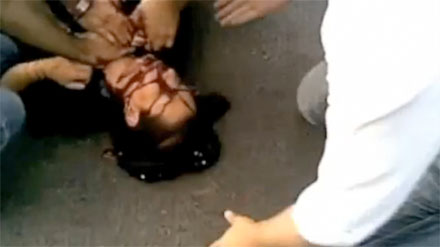
As the 40th day of Neda’s death was commemorated in Iran a few days ago, and as I read in an article on Truthout on August 11 that a staggering number of 4,000 people were detained in protests that followed June’s disputed presidential election, I was reminded of my years there as a high school student just before the Islamic Revolution subdued the country and cast it into a nightmare from which it is still trying to awaken 30 years later. Chants of “death to the dictator,” images of young men and women pounding their fists in the air, soldiers and agents in civilian clothing attacking crowds of protesters, were all stark reminders to me of that long-ago revolution gone awry, and of the innocent people who risked their lives to throw out a tyrant, only to fall victim to a more savage regime. The tragic death of Neda, the young woman whose last moments were captured by a cell phone camera and shown across the globe, struck a personal blow, and reopened in me a wound that I didn’t realize had never healed.
My favorite teacher in high school was a man called Mr. Fatemi, who taught Persian literature. In his early forties, very tall with broad shoulders, he was one of the few teachers who inspired more in his students than a strong desire to nap. His willingness to entertain us, and his great sense of humor, might have encouraged lax discipline in his classroom, but given his massive size and notably decisive demeanor, no one dreamed of challenging his authority. With his eyes closed, he often recited Hafiz’s poetry, walking down the aisle with one hand holding the book, the other beating out the rhythm like an orchestra conductor. His warm, resonant voice made listening to him an enchanting experience. Frequently he spoke of his son, Afshin, a young man who had just passed conquiere, the extremely competitive national exam for entering the university. In those days, thousands upon thousands of students participated in conquiere, but only the top one or two percent were admitted due to the university’s limited capacity.
Mr. Fatemi’s eyes sparkled with pride and delight when he talked of Afshin. He quoted Hafiz as a prelude to discussions of “the light of his eyes,” his son.
Sweet dreams I had: Wine-goblet I retain
It’s revealed now: That success I gain.
Then he smiled. “You can all do that, boys,” he whispered, as his gaze panned across the room to ensure that he made eye contact with every single one of us. “And then your parents will talk about you as I talk about my Afshin.”
He didn’t need excuses to report on Afshin’s progress. “He’s gotten all A’s this term…. He’s taking the hardest classes…. His professors are encouraging him to continue beyond his undergraduate degree…. Dr. Fatemi? Yes, I like the sound of that.”
Sometimes, he looked at me and winked, subtly reminding me of a conversation we once had, when he told me that if anyone in our class could do what his Afshin had done, it would be me. I was, in his eyes, the only one with enough of what took to be just like his son.
I didn’t have to be older than I was to envision Mr. Fatemi’s dreams for his son’s future, and unfortunately, I also didn’t have to be older to feel the pain he felt when the news of his son’s arrest and execution rattled our neighborhood. Afshin was accused of being an activist, seen in student gatherings, and strongly suspected of association with a formidable opposition group threatening the rule of His Majesty, the King of the Kings, Mohammed Reza Shah Pahlavi. Afshin had been on the SAVAK’s hunt list.
Mr. Fatemi never taught again. He faded into his private life, occasionally surfacing here and there in my school neighborhood, walking around aimlessly with a limp for which no one knew the cause. The lost look in his eyes once met mine, when I attended the gathering commemorating the 40th day of his son’s death, and I noticed a momentary spark in his gaze and I almost cried, “No, no, no … I’m not Afshin.” But mercifully the flash disappeared quickly. I was off the hook, except that the burn I felt in my heart has been there for the last 30 years. When I saw Neda’s eyes roll back in their sockets, I realized for the first time in my life that some wounds never heal, and I began to cry, desperately, because when Afshin died, I was too young and too proud to cry. But this time, I knew better; I cried for him, for Neda, for the brave citizens of Iran who fearlessly stood up for their rights, for the other 160 people who died in this struggle, but whose last moments were not captured on any cameras, for the senseless death of the young and the shattered dreams of their parents. When Afshin died, I thought he had sacrificed himself for a good cause – a real hero – but his death was in vain; I pray to God that Neda’s was not!
AUTHOR
Mahbod Seraji is the author of “Rooftops of Tehran.” This commentary was first published in TruthOut.org.






